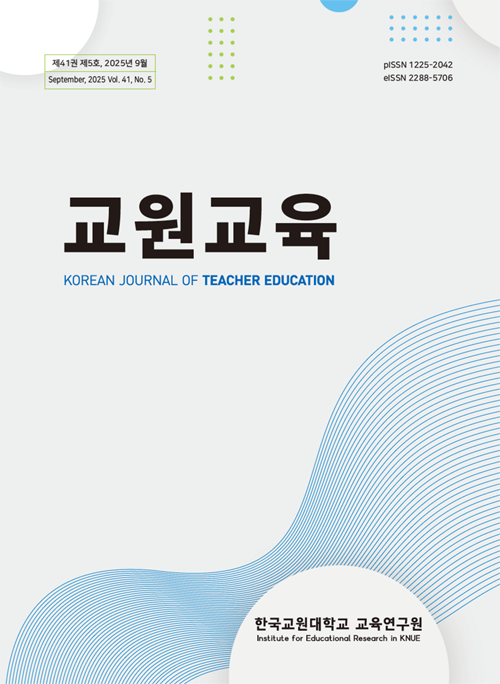- 영문명
- An Analysis of Elementary School Teachers' Stages of Concern and Levels of Use Regarding the Teacher Curriculum in Jeollanam Province
- 발행기관
- 한국교원대학교 교육연구원
- 저자명
- 박희진(Hee-jin Park)
- 간행물 정보
- 『교원교육』제41권 제5호, 303~326쪽, 전체 24쪽
- 주제분류
- 사회과학 > 교육학
- 파일형태
- 발행일자
- 2025.09.30

국문 초록
연구목적: 본 연구는 전라남도 초등교사를 대상으로 교사교육과정에 대한 관심도와 실행 수준을 분석하고, 수업리더십 수준에 따른 차이를 탐색함으로써 교사교육과정 실행 활성화를 위한 시사점을 도출하고자 하였다. 특히 농어촌 지역의 특수성과 소규모 학교 비율이 높은 전라남도의 교육 맥락을 고려하여, 교사교육과정의 정의적 수용(관심)과 행동적 실천(실행) 간의 관계를 구조화된 틀에서 분석하였다. 이러한 분석을 바탕으로, 전라남도 지역의 특수성을 반영한 교사교육과정 실행 지원 방안을 제시하고자 한다.
연구방법: CBAM(Concerns-Based Adoption Model) 이론을 기반으로 전라남도 읍·면 지역에 근무하는 초등교사 185명을 대상으로 양적 연구를 실시하였다. 관심도는 SoCQ(Stages of Concern Questionnaire)를, 실행 수준은 LoU(Levels of Use)를 바탕으로 구성된 설문도구를 활용하였다. 또한 교사의 수업리더십 수준에 따른 집단 간 차이를 분석하였다.
연구결과: 관심도에서는 교사들이 정보적, 개인적, 운영적 단계에서 상대적으로 높은 관심을 보였으나, 결과적, 협력적, 강화적 단계에서는 관심 강도가 낮게 나타났다. 실행 수준에서는 기계적 실행과 비사용 단계가 높은 비중을 차지하였으며, 자율적이고 창의적인 실행 수준으로의 이행은 제한적인 것으로 나타났다. 특히 수업리더십 수준이 높은 교사일수록 결과적, 협력적, 강화적 관심이 높고, 실행 수준 또한 통합화와 갱신 단계에서 유의미한 차이를 보였다.
결론: 본 연구는 교사교육과정 실행에 있어 교사의 교육과정 실행 역량, 수업리더십, 협력적 학교 문화가 핵심 요인임을 확인하였다. 이에 따라 교사교육과정 실행을 활성화하기 위해서는 ①교육과정 문해력을 중심으로 한 교사 전문성 강화, ②학교의 협력적 실행 문화 조성, ③실행 여건을 보장하는 제도적·시간적 지원 확보, ④실행을 촉진하는 정책적 가이드라인 및 피드백 체계 마련이 요구된다. 본 연구는 전라남도 지역의 특수한 맥락에서 교사교육과정에 대한 관심도 및 실행 수준을 체계적으로 분석하였다는 점에서 실천적·정책적 의의를 지닌다.
영문 초록
Purpose: This study aimed to analyze the Stages of Concern and Levels of Use among elementary school teachers in Jeollanam Province regarding the teacher curriculum, with a particular focus on differences by instructional leadership level. Given the region's rural context and high proportion of small schools, the study applied a structured framework to examine teachers' affective responses and behavioral practices in implementing the teacher curriculum. The findings aim to propose support strategies that reflect regional characteristics and teacher needs.
Methods: Grounded in the Concerns-Based Adoption Model (CBAM), this quantitative study surveyed 185 elementary school teachers working in Jeollanam Province. The Stages of Concern were measured using the Stages of Concern Questionnaire (SoCQ), and the Levels of Use were assessed with a structured instrument based on the LoU framework. Differences in responses were also analyzed according to teachers' levels of instructional leadership.
Results: Teachers showed relatively high concern at the informational, personal, and management stages but low concern at the consequence, collaboration, and refocusing stages. In terms of use, most teachers were at the mechanical use and non-use stages, indicating limited advancement toward autonomous and creative implementation. Teachers with higher instructional leadership levels exhibited significantly higher concern at later stages and greater representation at integration and renewal levels of use.
Conclusion: The study confirms that curriculum enactment capability, instructional leadership, and collaborative school culture are essential factors for activating teacher curriculum implementation. To promote effective use, the following are recommended: (1)enhancing teacher professionalism through curriculum literacy, (2)cultivating a collaborative school culture, (3)securing institutional and temporal support, and (4)providing policy-level guidance and feedback systems. The study provides practical and policy insights based on an in-depth analysis of teachers' Stages of Concern and Levels of Use in the unique educational context of Jeollanam Province.
목차
Ⅰ. 서 론
Ⅱ. 연구방법
Ⅲ. 연구 결과
Ⅳ. 결론 및 제언
참고문헌
키워드
해당간행물 수록 논문
참고문헌
최근 이용한 논문
교보eBook 첫 방문을 환영 합니다!

신규가입 혜택 지급이 완료 되었습니다.
바로 사용 가능한 교보e캐시 1,000원 (유효기간 7일)
지금 바로 교보eBook의 다양한 콘텐츠를 이용해 보세요!


